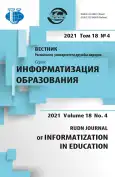Using Google Trends to analyze top EdTech-trends 2020 in Russia and worldwide
- 作者: Osipovskaya E.A.1
-
隶属关系:
- Online University Skillbox
- 期: 卷 18, 编号 4 (2021)
- 页面: 291-304
- 栏目: INFORMATIZATION OF EDUCATION: A GLOBAL PERSPECTIVE
- URL: https://journal-vniispk.ru/2312-8631/article/view/321218
- DOI: https://doi.org/10.22363/2312-8631-2021-18-4-291-304
- ID: 321218
如何引用文章
全文:
详细
Problem and goal. The top Educational Technology (EdTech) trends 2020 in the world and in Russia particularly are examined. The analysis involves the research of Gartner - the world’s leading advisory company that is specialized in information technology market, the Organization for Economic Co-operation and Development, The Open University - a public research university, L&D Global Sentiment Survey and HolonIQ - a market intelligence platform. Methodology. The data from these reports was aggregated, grouped and analyzed by using Google Trends. The geographical areas embraced Russia and the whole world. The data was sorted by choosing “Jobs and Education” section and 2020 year as a time period. Results. Four dominant areas were identified: 1) industries; 2) formats; 3) tools; 4) analytics. Only the first two categories were involved in the analysis. The section “formats” embraced massive open online courses, hybrid education, blended learning, personalization, flipped classroom, inclusive education and simulation-based education. The section “tools” included mobile technologies, social networks, mixed and augmented reality (AR/VR), virtual classrooms, artificial intelligence (AI) and learning management system (LMS). Each section element was illustrated by the EdTech case. Conclusion. The most popular search query in the “formats” group among Russian users and the global audience in general was the implementation of inclusive education during the COVID-19 pandemic. Concerning the “tools” category, all users were interested in the features and types of LMS platforms for organizing online classes in 2020.
作者简介
Elizaveta Osipovskaya
Online University Skillbox
编辑信件的主要联系方式.
Email: e.osipovskaya@gmail.com
Candidate of Pedagogical Sciences, lector
6 Leninskii Prospekt, bldg 20, Moscow, 121205, Russian Federation参考
- Malofeev NN. Inclusive education in the context of modern social policy. Education and Training of Children with Developmental Disabilities. 2009;(6):3-9. (In Russ.)
- Hegarty S. Reviewing the literature on integration. European Journal of Special Needs Education. 1993;8(3):190-200. https://doi.org/10.1080/0885625930080302
- Freeman S, Alkin M. Academic and social attainments of children with mental retardation in general education and special education settings. Remedial and Special Education. 2000;21(1):3-26. https://doi.org/110.1177/074193250002100102
- Zigmond N. Where should students with disabilities receive special education services? Is one place better than another? Journal of Special Education. 2003;37(3):193-199. https://doi.org/110.1177/00224669030370030901
- Lindsay G. Educational psychology and the effectiveness of inclusive education/ mainstreaming. British Journal of Educational Psychology. 2007;77(1):1-24. https://doi.org/110.1348/000709906X156881
- Szumski G, Smogorzewska J, Karwowski M. Academic achievement of students without special educational needs in inclusive classrooms: a meta-analysis. Educational Research Review. 2017;21:33-54. https://doi.org/10.1016/j.edurev.2017.02.004
- Block ME, Obrusnikova I. Inclusion in physical education: a review of the literature from 1995-2005. Adapted Physical Activity Quarterly. 2007;24(2):103-124. https://doi.org/10.1123/apaq.24.2.103
- Scott BJ, Vitale MR, Masten WG. Implementing instructional adaptations for students with disabilities in inclusive classrooms: a literature review. Remedial and Special Education. 1998;19(2):106-119. https://doi.org/10.1177/074193259801900205
- Harrower J, Dunlap G. Including children with autism in general education classrooms: a review of effective strategies. Behavior Modification. 2001;25(5):762-784. https://doi.org/10.1177/0145445501255006
- Nakken H, Pijl SJ. Getting along with classmates in regular schools: a review of the effects of integration on the development of social relationships. International Journal of Inclusive Education. 2002;6(1):47-61. https://doi.org/10.1080/13603110110051386
- Bossaert GH, Colpin SJ, Pilj K, Petry K. Truly included? A literature study focusing on the social dimension of inclusion in education. International Journal of Inclusive Education. 2011;17(1):66-99.
- Osipovskaya E, Dmitrieva S, Grinshkun V. Examining technology and teaching gaps in Russian universities amid coronavirus outbreak. In: Auer ME, Rüütmann T. (eds.) Educating Engineers for Future Industrial Revolutions. ICL 2020. Advances in Intelligent Systems and Computing (vol. 1328). Cham: Springer; 2021. p. 764-774. https://doi.org/10.1007/978-3-030-68198-2_72
- Graham CR. Blended learning systems: definition, current trends, and future directions. In: Bonk CJ, Graham CR. (eds.) Handbook of Blended Learning: Global Perspectives, Local Designs. San Francisco: Pfeiffer Publishing; 2006.
- Grinshkun V, Osipovskaya E. Teaching in the fourth industrial revolution: transition to education 4.0. CEUR Workshop Proceedings. 2020;2770:9-15.
- Skornyakova ER, Pinegina AA. Self-organization of students of non-linguistic specialties as a factor in the formation of a graduate of a new formation. Pedagogy. Questions of Theory and Practice. 2021;(6):1087-1095. https://doi.org/10.30853/ped20210133
补充文件









